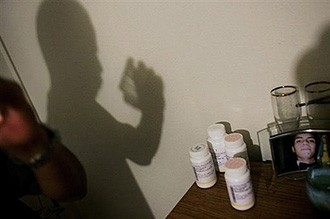
|
 |
 |
 Americas & Beyond | May 2008 Americas & Beyond | May 2008  
US Soldier Suicides May Top War Tolls
 Agence France-Presse Agence France-Presse
go to original


| | An Iraq war veteran drinks water to wash down one of four anti-depression and anxiety drugs he takes in 2006 in McAllen, Texas. (AFP/Chris Hondros) | | |
Suicides and "psychological mortality" among US soldiers who served in Iraq and Afghanistan could exceed battlefield deaths if their mental scars are left untreated, the head of the US Institute of Mental Health warns.

Of the 1.6 million US soldiers who have been deployed in Iraq and Afghanistan, 18-20 percent - or around 300,000 - show symptoms of post-traumatic stress disorder (PTSD), depression or both, said Thomas Insel, head of the National Institute of Mental Health.

An estimated 70 percent of those at-risk soldiers do not seek help from the Department of Defense or the Veterans Administration, he told a news conference launching the American Psychiatric Association's 161st annual meeting here.

If "one just does the math", then allowing PTSD or depression to go untreated in such numbers could result in "suicides and psychological mortality trumping combat deaths" in Iraq and Afghanistan, Insel warned.

More than 4,000 US soldiers have died in Iraq since the US invasion of 2003, and more than 400 in Afghanistan since the US led attacks there in 2001, of which some 290 were killed in action and the rest in on-combat deaths.

"It's predicted that most soldiers - 70 percent - will not seek treatment through the DoD or VA," Insel said at the meeting, at which the psychological impact of war is expected to top the agenda over the next four days.

Left untreated, PTSD and depression can lead to substance abuse, alcoholism or other life-threatening behaviors.

"It's a gathering storm for the civilian and public health care sectors," Insel said.

He urged public-sector mental health caregivers to recognize the symptoms of psychological troubles resulting from deployment to a war zone and be ready to provide adequate care for both soldiers and their families.

Other items on the agenda at the meeting, set to be attended by some 19,000 psychiatrists and mental health practitioners from around the world, include violence in schools, the psychology of extremism, and more light-hearted topics such as how music affects mood. | 
 | |
 |



